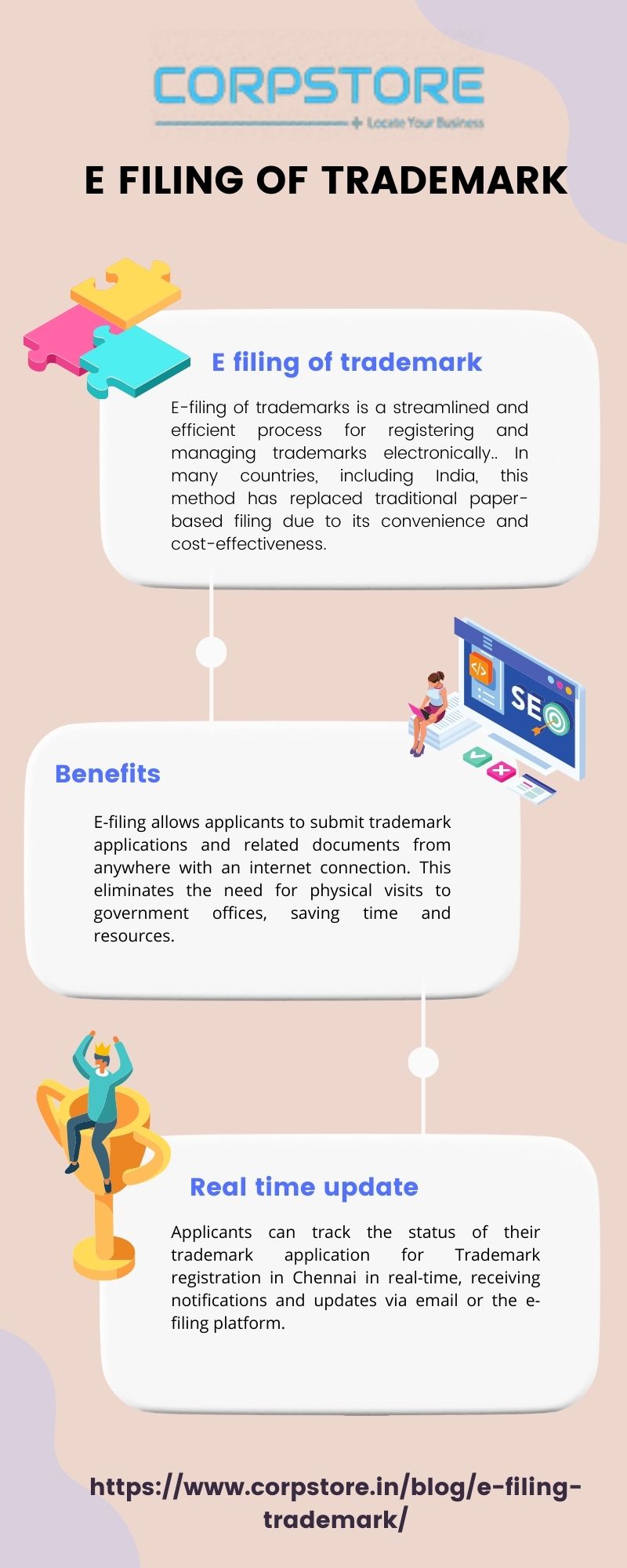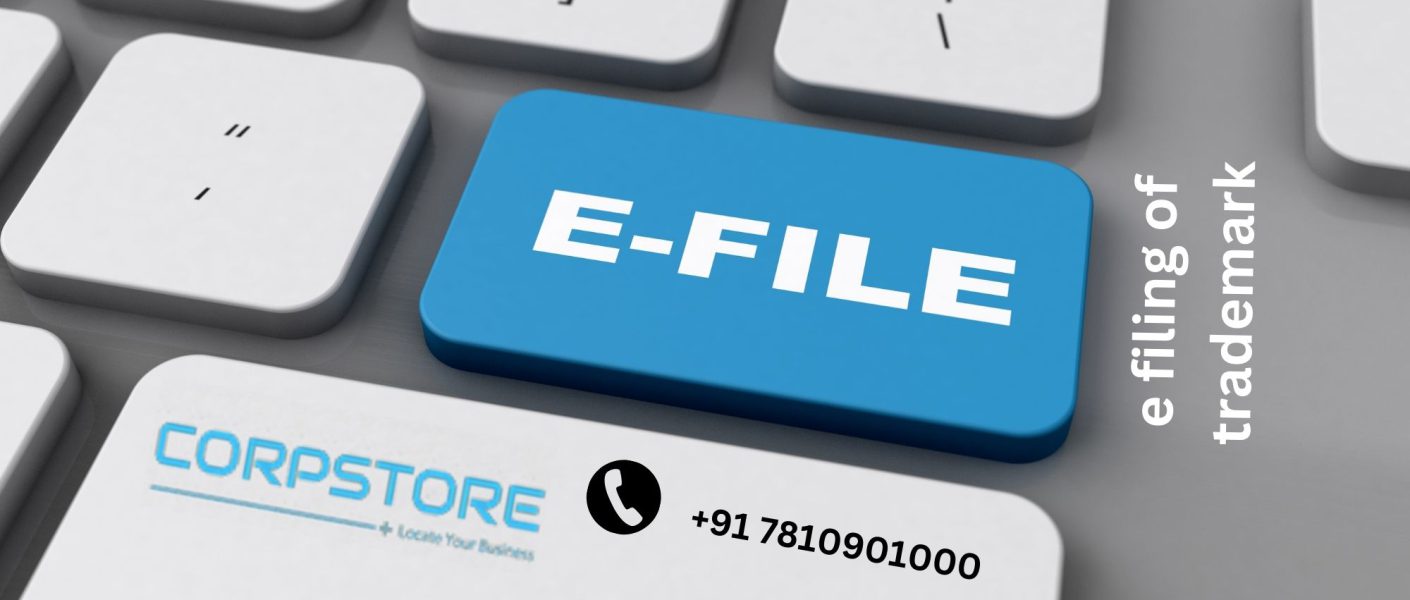E-filing of trademarks is a streamlined and efficient process for registering and managing trademarks electronically. In many countries, including India, this method has replaced traditional paper-based filing due to its convenience and cost-effectiveness. In this blog, we’ll delve into the process of e-filing for trademarks, its benefits, and the steps involved, using the Indian trademark registration system as an example.
Introduction to Trademarks
A trademark that has Trademark registration in Chennai is a unique sign, symbol, word, or combination thereof that is used to identify and distinguish goods or services of one entity from those of others.
Trademarks are essential for businesses as they provide exclusive rights and protection for their brands, logos, and product names, preventing others from using similar marks that may lead to confusion in the market.
Benefits of E-filing for Trademarks
E-filing for trademarks offers several advantages, making it the preferred method for registering and managing trademarks:
Convenience: E-filing allows applicants to submit trademark applications and related documents from anywhere with an internet connection. This eliminates the need for physical visits to government offices, saving time and resources.
Cost-Efficiency: E-filing typically reduces administrative costs associated with paper filing, such as printing, postage, and courier services.
Quicker Processing: Electronic applications for Trademark registration in Chennai are processed faster than paper-based applications, leading to quicker registration and protection of trademarks.
Enhanced Accuracy: E-filing systems often include validation checks, reducing the likelihood of errors or missing information in the application.
Real-Time Updates: Applicants can track the status of their trademark application for Trademark registration in Chennai in real-time, receiving notifications and updates via email or the e-filing platform.
Secure Data: E-filing platforms employ stringent security measures to protect sensitive applicant information and documents.
Improved Accessibility: E-filing systems are accessible 24/7, allowing applicants to submit applications at their convenience.
The Process of E-filing for Trademarks in India
Trademark registration in India is administered by the Controller General of Patents, Designs and Trademarks, which operates under the Department for Promotion of Industry and Internal Trade (DPIIT). The e-filing process for trademarks in India is quite straightforward and comprises several key steps:
User Registration:
Before initiating the e-filing process, the applicant needs to create a user account on the official website of the Intellectual Property India (IPI) office. The applicant’s email address and phone number must be verified to complete the registration.
Filing of Trademark Application:
Once the applicant is registered, they can file a trademark application through the online portal. The application form must be filled out with details such as the applicant’s information, the trademark details (including an image if applicable), and the class of goods or services for which the trademark is to be registered.
Examination and Examination Report:
The trademark application for Trademark registration in Chennai undergoes examination by the trademark office to ensure it complies with the legal requirements. If any discrepancies are found, the applicant may receive an examination report, which outlines the issues that need to be resolved within a specific timeframe. The applicant can respond to the report and make necessary amendments using the e-filing portal.
Publication in the Trademark Journal:
If the trademark application meets all requirements and there are no objections, it is published in the official Trademark Journal. This publication is accessible to the public, allowing anyone to oppose the registration within a specific period. The applicant can also track the publication status through the e-filing system.
Opposition and Hearing:
If there are oppositions to the trademark registration, a hearing may be scheduled by the trademark office to resolve disputes. The applicant can provide their response and evidence electronically through the e-filing portal.
Registration Certificate:
If there are no oppositions or the trademark office finds in favor of the applicant, a registration certificate is issued. The applicant can download this certificate from the e-filing portal.
Post-Registration:
Once the trademark is registered, the e-filing portal can be used for various post-registration activities, including renewals, modifications, and status tracking.

Documents Required for E-filing of Trademarks
When e-filing for Trademark registration in Chennai, you’ll need several essential documents and details:
Logo/Trademark Image: A clear representation of the trademark, preferably in a .jpg format. For word trademarks, you’ll need the name as text in a standard font.
Applicant Details: This includes the name, address, nationality, and legal entity (individual, partnership, company, etc.).
Trademark Details: A description of the trademark, including whether it’s a wordmark, device mark, or a combination of both.
List of Goods/Services: The classes of goods or services for which the trademark is intended to be used. The list should be aligned with the Nice Classification system.
Date of First Use: If the trademark has been used in commerce, provide the date of first use. If not, leave this section blank.
Common Challenges in E-filing for Trademarks
While e-filing offers many benefits, there can be challenges to consider:
Technical Issues: Internet connectivity, computer malfunctions, or issues with the e-filing portal can disrupt the application process of Trademark registration in Chennai.
Learning Curve: Users who are unfamiliar with the e-filing system may face a learning curve while navigating the portal and understanding the application process.
Legal Expertise: Trademark law can be complex, and applicants may need legal guidance to ensure their application complies with all requirements.
Oppositions: The possibility of oppositions and disputes may require legal representation and effective communication through the e-filing portal.
Conclusion
E-filing for trademarks has revolutionized the trademark registration process, making it more accessible, efficient, and cost-effective. The online platform streamlines the entire registration process, from application submission to post-registration management, and offers real-time tracking and updates.
While e-filing for Trademark registration in Chennai offers many advantages, it is essential for applicants to be well-informed about the specific requirements and guidelines in their respective jurisdictions. In India, the process is administered through the Intellectual Property India (IPI) office, and applicants must follow the prescribed steps and provide accurate information.
The ability to file and manage trademark applications online has significantly reduced the administrative burden on businesses and individuals seeking to protect their intellectual property. With the continued development of e-filing systems and improved accessibility, the process will likely become even more user-friendly and efficient in the future. Trademarks are invaluable assets for businesses, and e-filing provides a reliable and convenient means to safeguard these assets and protect brand identities in a digital age.





